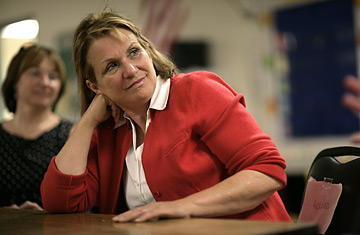
Elizabeth Edwards, wife of Democratic Presidential candidate John Edwards
To follow her for a day on the campaign trail is to see an Elizabeth Edwards who looks the picture of health. Her hair is full, and her blue eyes as bright as ever. She has slimmed down since the 2004 campaign, but insists that is the hard earned badge of dieting, not disease. Still, every now and then, there comes a reminder. Before taking off her jacket recently in an uncomfortably warm living room in Bow, N.H., she asked a local television crew and a TIME photographer to move and shoot her from her left side, because her right arm is swollen from the treatment of her lymph nodes. Losing her train of thought in trying to answer a multi-part question someone asked her at a school in Manchester, she joked: "I call it chemo-brain; I could blame it on the fact that I'm 58."
When it comes to the never-ending debate over Elizabeth and John Edwards' decision to continue his campaign after her diagnosis with incurable breast cancer, much of the blame has been directed at her. In devoting herself to her husband's goal, was she ignoring what might be best for her children? Earlier this month, Edwards got into a public spat with a Clinton supporter, who had blogged that she was a "terrible mother." Elizabeth, a lifelong insomniac who spends her wakeful hours surfing the internet, came across the post and wrote back: "You don't get to judge me because you think you know exactly what you would do if you had my disease. I want to be really clear: you don't know."
But there is at least one person who did know. Ann Romney, who was diagnosed in 1998 with multiple sclerosis, called Elizabeth shortly after the Edwards made their announcement in March. "I totally understand why you're still fighting," Romney told her. "I totally get it."
It is an axiom of American politics that you've got to really, really want it before you decide to run for President, but there is a whole other dimension to the decision when one member of the family is also struggling with a debilitating, even life-threatening illness. This year, there are not one but two women on the campaign trail in that situation. Edwards calls Romney "a lovely woman." And while their husbands are of two different parties, pitted against each other for the biggest prize in politics, "the spouses are not at war with each other," says Edwards. "It's much easier to do this if you do not think of these other women who also making these sacrifices as the enemy. And in particular, we are both suffering from conditions that are likely to stay with us forever, so we have that connection."
While Romney is vigorous, and looks at least a decade younger than her age (like Edwards, she's 58), the disease has limited what she can do on the campaign, she says. Romney tries to travel no more than three days at a time, and keeps alert for signs that she is pushing herself too hard. "I've learned, even within myself, I can start telling when I'm wearing down," Romney says. "What happens to me is I almost can't talk. I get to the point where my brain doesn't even work, and I can hardly get words out and I look at everyone with this glassy stare, like, "I'm done. I've hit empty. Bye. I don't care what you've got on my schedule.'" At that point, she goes home to the things that "recharge my batteries": her horse, acupuncture, reflexology and "a slower rhythm."
Her illness has meant she can't be campaigning with her husband as much as he would like, given how his mood lightens when she is around. "They call me the Mitt Stabilizer," she says. "I'm able to just make him laugh, and get more lighthearted about the whole thing, and not take it so seriously." But her limitations have also allowed her to touch voters in a way she couldn't otherwise. "Nine times out of ten, when someone comes up to me afterwards, they are encouraged by me being out there and giving hope to other people," Romney says. "They are grateful and their lives have been touched in an impactful way."
Elizabeth Edwards has an additional challenge, given that she must also factor in the needs of two young children. But she says her family has found a balance that works for them. Emma Claire, 9, and Jack, 7, are being home schooled, and join their parents on the campaign trail when they are going to be out for a while, or when they are going somewhere the children would find interesting, educational or fun. Sometimes that means upending their schedule: a few days on the road in the middle of the week; school on the weekend. Their parents make sure there is also time for friends, and for Jack's tae kwon do class.
Though there are plenty who wouldn't have done any of this the way she did — and have said so — Edwards seems not to have any doubts. "The choice we had to make was a very public choice, but the choice didn't belong to the public. The choice belongs to us," she says. "Around the country, every place that I've gone, people who have been in the same shoes that I've been — sadly — have all made the same choice, to live, to embrace the things they care about."
As for herself, Edwards insists that the life she is living now is not being defined by the death she knows is coming sooner than it should. "I think about the cancer on my way to the doctor, while I'm in the doctor's office," she says. "I get back in my car and I'm not thinking about the cancer. "I don't talk about it. I don't think about it," she adds. "I'm just pushing on."